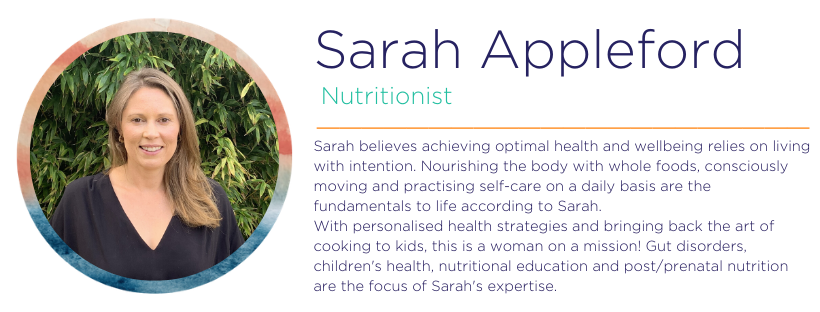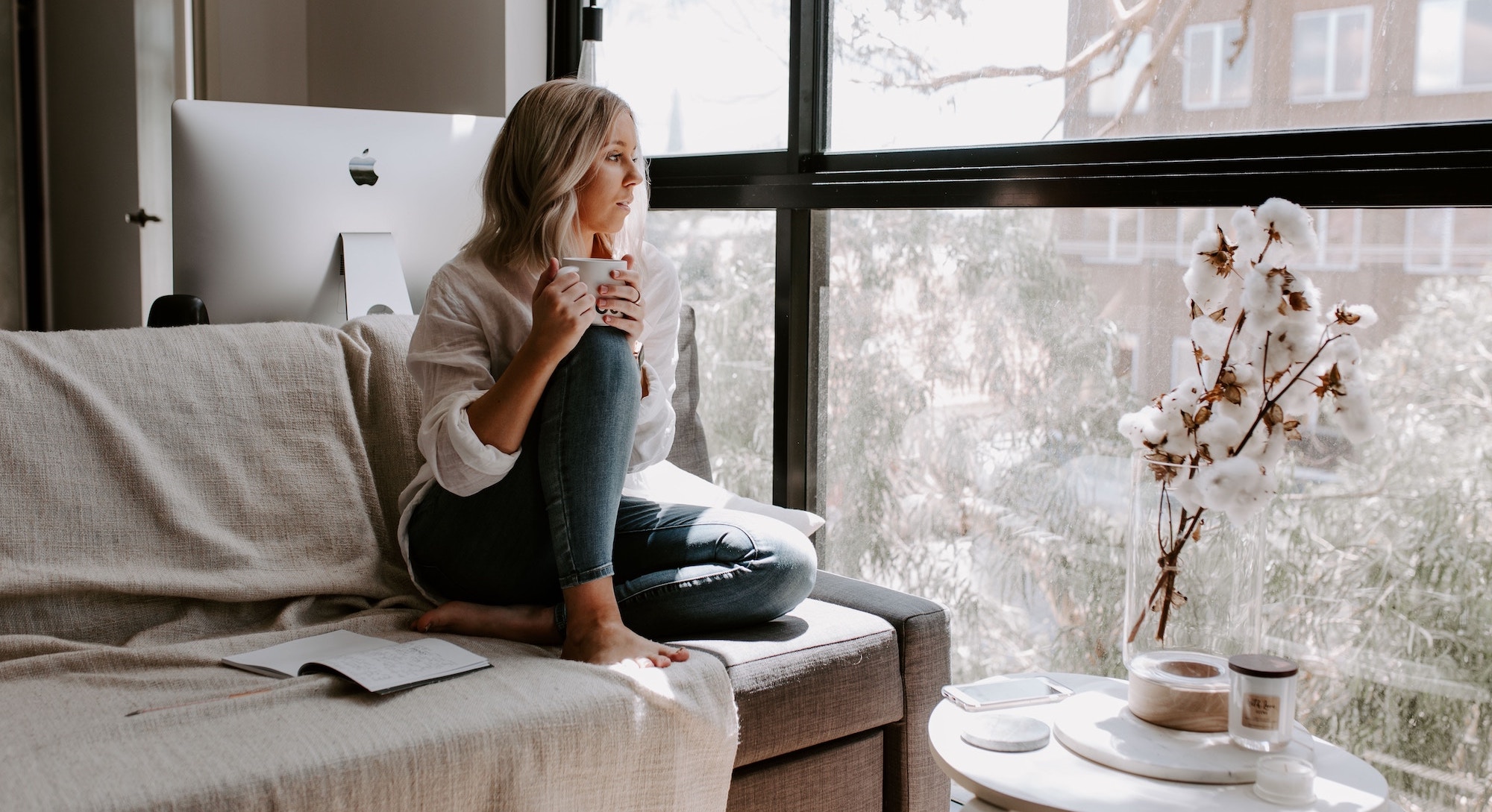In times of uncertainity, stress and anxiety can rise to the surface. Our nutritionist, Sarah, shares some lifestyle and dietary tips to help you navigate this challenging time.
To say we’re going through uncertain times thanks to the coronavirus pandemic is probably an understatement. Social distancing no doubt has only added to the stress as businesses come to a standstill, jobs are lost and schools close in a bid to slow the rapid spread of COVID-19.
During stressful times like these where there is an overwhelming feeling of loss and uncertainty, it’s vital we pay attention to our own mental health and that of our loved ones. Isolation from friends and family members is often exacerbated by depressing news stories and overconsumption of social media. As a result, anxiety, stress, depression all can rise to the surface and if we’re not careful, can become crippling.
Thankfully, there are things we can do for managing stress and to stay on top of depression and anxiety disorders so they don’t progress into a chronic mental health issue. All it takes is a little self-care.
Stress is a normal physiological response, but…
Stress is the ‘flight or fight’ response to physical and emotional stressors ranging from exercise to financial problems, or in this current case, an event like the COVID-19 pandemic. Normal levels of stress are healthy and beneficial to both our mental and physical wellbeing. It helps us change and adapt. It makes us stronger both biochemically and emotionally.
However, chronic stress without periods of recovery can lead to exhaustion, predisposing us to health complications such as immune suppression, insulin resistance, hormone disturbances and neurological issues. Managing your stress levels through diet and lifestyle changes can help improve your physical and emotional wellbeing.
Here, I want to share some lifestyle and dietary changes that can help in managing stress and anxiety. Take a look and ask yourself, what can you do at this present moment to take care of yourself? What single action can I make today that will reduce my stress response?
Lifestyle modifications to make in stressful situations

With social distancing and self-quarantine in play, your daily lifestyle has likely been turned upside down. However, there are some things you can do during these uncertain times that can help you manage your feelings of overwhelm, fear, anxiety and stress. And the good thing is, many of these can be done at home and won’t cost you a thing.
Here are my top suggestions:
Practice mindfulness, visualisation or deep breathing techniques
Basic deep belly breathing can be a great way to calm the stress response. If you want assistance with meditative practices, apps like Smiling Mind, Insight Timer and Breathe+ are my go-to.
Increase your time spent outdoors in nature
Obviously, this doesn’t mean sit on Bondi beach with 50 of your closest friends and family members! While some parks and outdoor spaces are closed, there are plenty of places to go where you won’t be in contact with anyone. You also may want to choose your timing wisely and if you can’t find a place to get in touch with nature, consider spending more time in your own backyard or practice grounding and make sure you expose yourself to the sunshine for added vitamin D benefits.
Exercise daily
Has your gym shut down with the latest recommendation of the department of health? Yes, this makes it difficult to get our usual workout done but there are plenty of opportunities to move your body while in isolation. You only have to Google home workouts to see a number of online HIIT classes, pilates or yoga sessions or cardio workouts to find inspiration.
Journal
You may be surprised at how valuable getting your thoughts down on paper can be during challenging times. I find journalling great to start my day finding gratitude in the little things or at night to dump all my thoughts before I go to sleep.
Take up a new creative hobby
Self-quarantine and isolation give us an opportunity to embrace our creative side. Start drawing, knitting, gardening, pottery. Jump online and have a look at free courses or what your local community is offering.
Improve your sleep practices and bedtime routine
Sleep is one of the first things that gets disrupted in times of stress. Improving your sleep practices and implementing a bedtime routine is essential to help us cope in these uncertain times. What does your current bedtime routine look like? My tips to improve your bedtime routine include:
- Switching off devices 1 hour before bed;
- Journal or read a book;
- Meditate or practice deep breathing before you fall asleep;
- Avoid eating heavy or large meals 2-3 hours before bedtime;
- Avoid stimulates like caffeine or sugar;
- Spend time washing your face, applying your body care products;
- Make sure your room is inviting, dark and at a low-mid temperature.
Get a support group
Isolation can fuel mental health issues, but just because we don’t have face-to-face or physical contact with our friends and family members, doesn’t mean we can’t have support. Check-in with a group of positive people – make regular phone calls or set up a Zoom or skype catch up.
Switch off
It’s easy to be overloaded with information. In fact, there is a fine line between being overloaded and informed. Do yourself a favour and switch off from social media and the news regularly. Set a time period where you can be online and listing to the latest news or scrolling on Facebook and allow time to disconnect.
Dietary changes to help manage stress

As with the above lifestyle modifications, there are several tweaks you can make to your general diet to help manage stress. Right now during this coronavirus outbreak, you may have found you’re stress or emotional eating. And that’s okay! It’s only natural for us to turn to anything that feels good as one of our default coping strategies.
However, what we do know is nutrition has a profound impact on our mood and our overall mental health status. Stress is often accompanied by carbohydrate cravings due to their tryptophan-serotonin enhancing qualities. Indulging in too many refined carbs and processed foods set us up for blood sugar imbalances which lead to all sorts of issues including fatigue, poor mood, weight fluctuations…
A healthy diet helps us to settle the imbalances caused by the stress cascade.
Reduce pro-inflammatory foods including refined foods, saturated fat and sugar
These include processed, refined carbs, high sugar and fried foods.
Increase foods high in essential fatty acids
Think fatty fish like salmon, avocado, olive oil, nuts and seeds.
Increase antioxidant intake
Make sure you’re eating a variety of colourful fresh fruits and vegetables to increase your antioxidant intake. This helps to reduce oxidative stress as well as increase our immune function which is likely to be compromised during stress.
Ensure adequate quantities of protein
Quality protein like meat, poultry, fish, eggs and natural yoghurt can help reduce cravings and provide the necessary nutrients for our neurotransmitter production.
Increase your fibre
Increase fibre-rich foods like leafy green vegetables, legumes and whole grains to help stabilise your blood sugar levels and provide valuable nutrients like B vitamins for energy production. Fibre from these sources also helps to feed your beneficial gut bacteria.
Reduce caffeine, alcohol and soft drink intake
Stimulates like caffeine and alcohol can over-stimulate our HPA-axis (hypothalamus-pituitary-adrenal) exacerbating stress, anxiety and fatigue. They can also disrupt your sleep cycle and the absorption of nutrients and pharmaceuticals. If you are a high caffeine drinker, it’s best to reduce slowly to avoid withdrawal symptoms like headaches, low mood and fatigue.
About the author:

